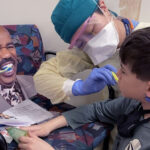The art of showing up: Six ways to support a friend who has a child in the hospital

“Let me know if there’s anything I can do.”
Nine little words spoken with the best of intentions but aren’t necessarily all that helpful for someone faced with having a child in the hospital. But why?
“People really want to do good things,” says Annie Banks, a social worker with the Hale Family Center for Families at Boston Children’s Hospital. “But to give a blank slate and expect someone to tell you what they need is a lot for them to think about — especially when they already have so much on their mind.”
Here, Banks and others from the Hale Family Center for Families break down the art of showing up, including its delicate balance of logistics and emotions, and some ways to provide meaningful support for a friend or loved one.
1) Give options
In an effort to be unintrusive, it’s common to say things such as, ‘let me know how I can help.’ It’s well-meaning, but such a nebulous offer can inadvertently assign added responsibility to your friend, who likely won’t ask for any help at all.
Instead, the team suggests finding tangible ways you’re able to help with the day-to-day. Things like arranging house cleaning, lawn care, pet sitting, grocery deliveries, or gift cards to cover the cost of gas or parking can go a long way for a parent whose life has been disrupted by having a child in the hospital.
The question is: How do you accompany someone along the way – in a way that’s not intrusive but supportive?
— Annie Banks, LICSW
2) Get and give permission
“You really want to help someone in the way that’s right for them,” says Banks. To do that, she suggests sharing your ideas and then asking if those plans are OK. Because your friend is the expert on the needs of their own family.
Permission extends beyond determining what errands you can run; the Hale Family Center team says that it means gauging your loved one’s comfort level in sharing information about their child.
“Sometimes we avoid asking about specifics because we don’t want to make our friend uncomfortable,” says Banks. “But what happens is — because we don’t know how to ask — we don’t say anything, and that doesn’t feel good for anyone. So don’t be afraid to ask if it’s OK to ask about specifics and if it’s OK to share information with others.”
“They may not say ‘yes’,” Banks acknowledges, “But asking lets them know you’re invested.”
In addition to getting permission to help, the Hale Family Center team stresses the importance of giving permission to your friend to practice even the smallest self-care acts; this could mean taking a walk, getting coffee, or having their hair done.
“Sometimes parents just need someone to let them know it’s OK to step away from the bedside because they feel guilty if they come up with the idea on their own,” says Kristen Priven, a child life specialist.
3) Remember the family beyond the patient
“Often, people focus on the child in the hospital; they want to see and support the patient,” Priven says. “But in all reality, that child is very well taken care of; there are a lot of resources available in the hospital.” Therefore, Priven suggests offering to help other members of the family.
Boston Children’s Hospital and the Hale Family Center for Families are honored to help and support the families of our patients.
Our services include:
Learn more about patient and family resources at Boston Children’s Hospital.
“Watching or transporting kids to school and activities can go a long way in maintaining their sense of normalcy, which can easily be disrupted when a sibling is in the hospital,” she says.
Priven also advises letting your friend know that you still see and value them as their own person, and not just as a parent with a child in the hospital. It’s common for someone whose child is sick to abandon their own needs and sense of self. She suggests asking if there’s a good time to visit with just them and being someone they can talk to.
4) Keep the advice to yourself
“People often think it’s helpful to give lots of advice, especially if they’ve gone through a similar experience,” says Banks. “But I encourage people to not give advice and to listen, just listen. That’s what most people find helpful: just someone who will hear what they have to say.”
5) Be OK with what you (don’t) get back
Part of supporting a friend or loved one whose child is in the hospital or receiving ongoing care is accepting their limited availability and their silence.
“It’s important to let your friend know that you respect their boundaries and limitations,” says Jill Twomey-McLaughlin, a child life specialist. “That means not taking things personally — being OK if you don’t get a text or call back. Their inability to stay in touch isn’t personal; they’re focusing on their child.”
6) Be there
Showing up may not look like you thought it would and may make you uncomfortable, but that’s OK, says the Hale Family Center team. Your friend or loved one is in new territory, with new needs and boundaries, and the most impactful thing you can do is reassure them that you’re there for them.
“Even if it’s through a call or text or message,” Priven says, “Tell your friend, our friendship is so important to me and I’m always going to be here.”
Learn more about the Hale Family Center for Families at Boston Children’s Hospital.
Related Posts :
-

Dealing with feelings of grief in the time of coronavirus
As the COVID-19 outbreak moves into another month, do you find yourself feeling angry? Helpless? Sad? Lost? Disappointed? Accepting? Or ...
-

It takes a village: The frontlines of the behavioral health crisis
As challenging as navigating the pandemic has been for adults, it has been at least as stressful for children and ...
-

When a parent has mental illness, how to support kids
Between the long hours, many responsibilities, and lack of control, few jobs in our society are as demanding as parenting. ...
-

Getting a little help from a game show host: How Steve Harvey became Panos’ personal tooth fairy
11-year-old Panos loves to smile and sing — but getting him to show his teeth to a dentist hasn’t always ...





